Management and Operations: Leadership Theories and Practices at 4Com
VerifiedAdded on 2020/09/17
|14
|4389
|198
Report
AI Summary
This report provides a detailed analysis of leadership and operational management, focusing on the telecommunications company 4Com. It begins by defining and comparing the characteristics and roles of managers and leaders, highlighting the differences in their functions. The report then explores the roles of leaders and managers in various situations, including decision-making, training, and employee involvement. It delves into different leadership theories such as situational, contingency, and system leadership, examining their strengths and weaknesses and offering a critical analysis of their application. The report also covers key approaches to operational management, like Just-in-time and Total Quality Management, and the roles of managers and leaders within this context. Finally, it discusses factors impacting decision-making and operational management, concluding with an overview of the business environment and its effects. The report aims to provide a comprehensive understanding of leadership and management practices within a real-world business setting.
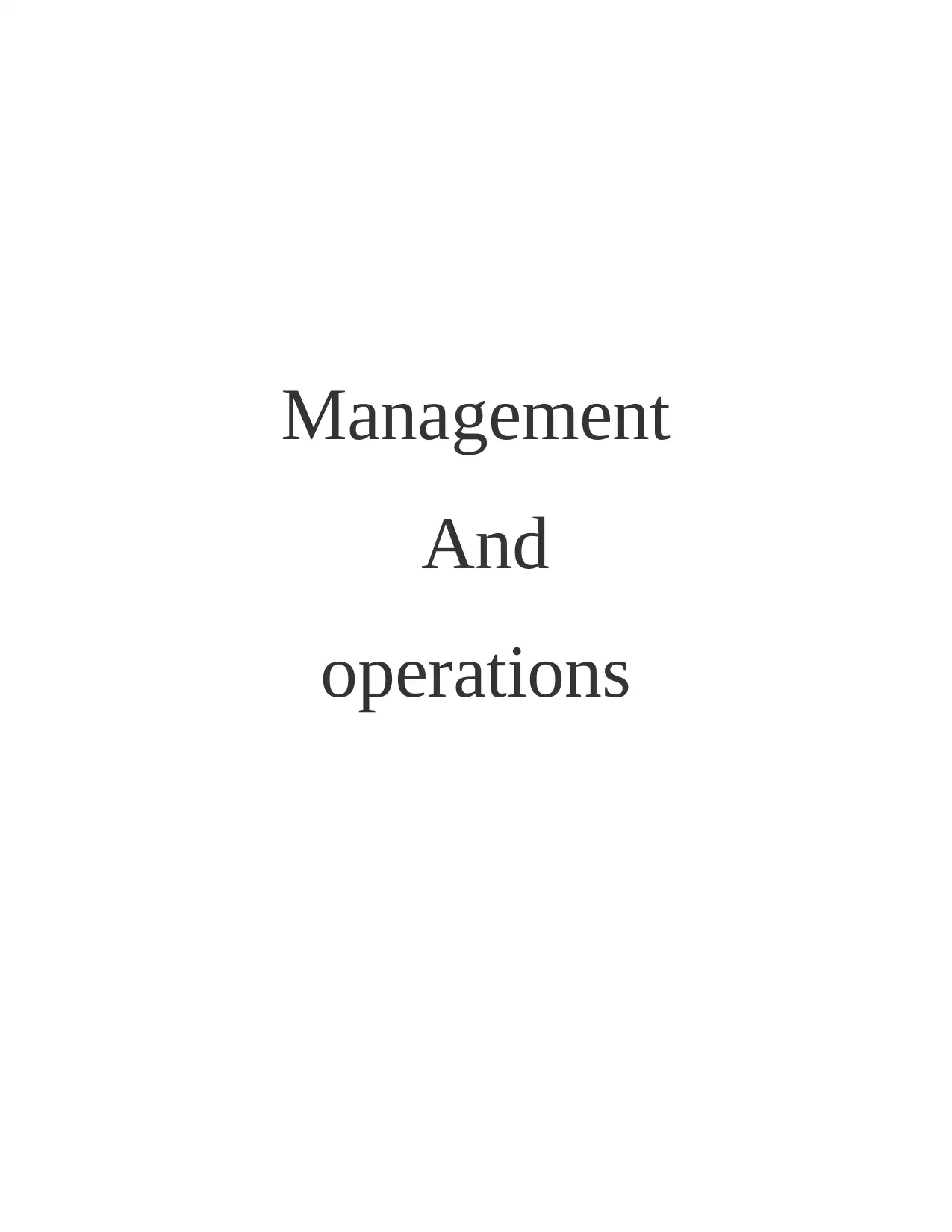
Management
And
operations
And
operations
Paraphrase This Document
Need a fresh take? Get an instant paraphrase of this document with our AI Paraphraser
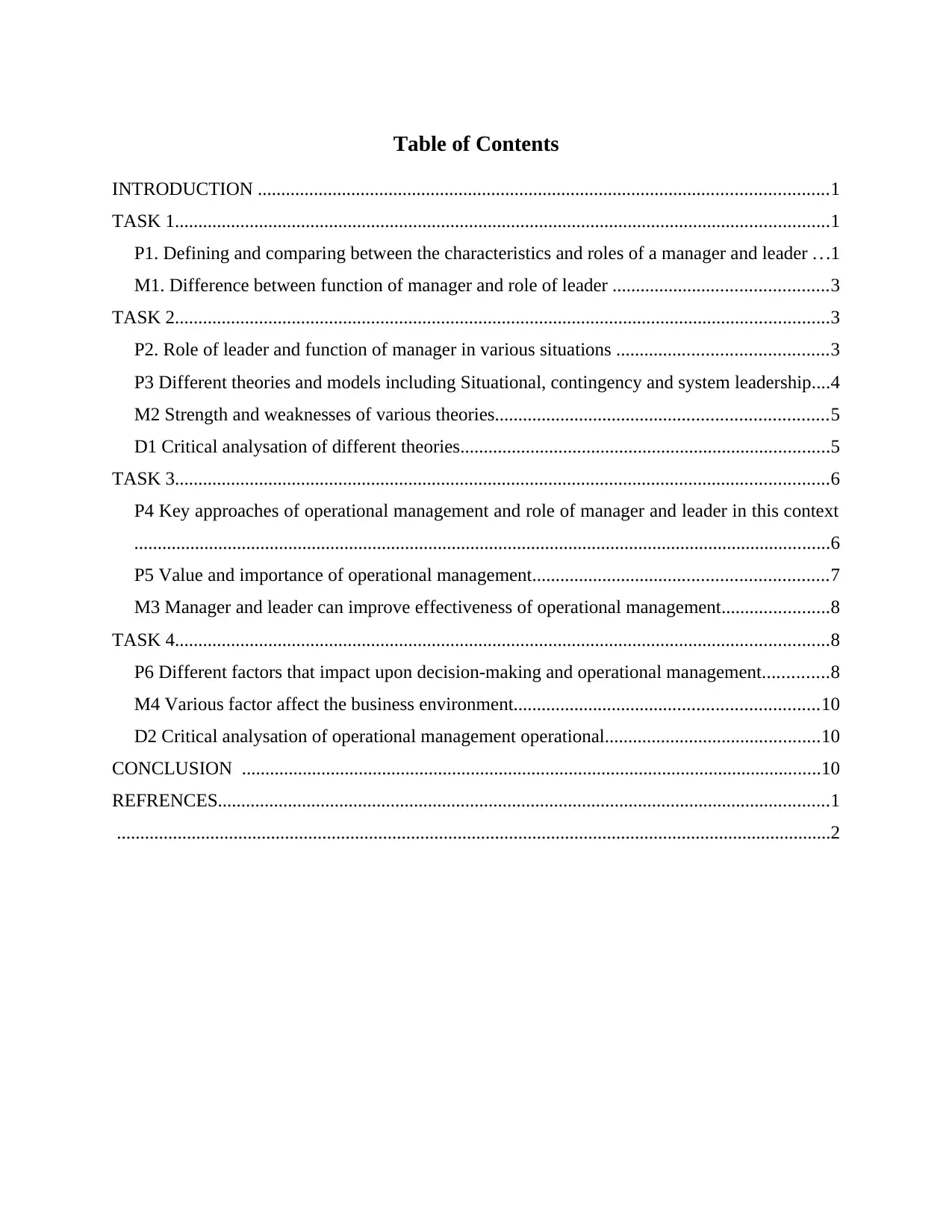
Table of Contents
INTRODUCTION ..........................................................................................................................1
TASK 1............................................................................................................................................1
P1. Defining and comparing between the characteristics and roles of a manager and leader . . .1
M1. Difference between function of manager and role of leader ..............................................3
TASK 2............................................................................................................................................3
P2. Role of leader and function of manager in various situations .............................................3
P3 Different theories and models including Situational, contingency and system leadership....4
M2 Strength and weaknesses of various theories.......................................................................5
D1 Critical analysation of different theories...............................................................................5
TASK 3............................................................................................................................................6
P4 Key approaches of operational management and role of manager and leader in this context
.....................................................................................................................................................6
P5 Value and importance of operational management...............................................................7
M3 Manager and leader can improve effectiveness of operational management.......................8
TASK 4............................................................................................................................................8
P6 Different factors that impact upon decision-making and operational management..............8
M4 Various factor affect the business environment.................................................................10
D2 Critical analysation of operational management operational..............................................10
CONCLUSION ............................................................................................................................10
REFRENCES...................................................................................................................................1
.........................................................................................................................................................2
INTRODUCTION ..........................................................................................................................1
TASK 1............................................................................................................................................1
P1. Defining and comparing between the characteristics and roles of a manager and leader . . .1
M1. Difference between function of manager and role of leader ..............................................3
TASK 2............................................................................................................................................3
P2. Role of leader and function of manager in various situations .............................................3
P3 Different theories and models including Situational, contingency and system leadership....4
M2 Strength and weaknesses of various theories.......................................................................5
D1 Critical analysation of different theories...............................................................................5
TASK 3............................................................................................................................................6
P4 Key approaches of operational management and role of manager and leader in this context
.....................................................................................................................................................6
P5 Value and importance of operational management...............................................................7
M3 Manager and leader can improve effectiveness of operational management.......................8
TASK 4............................................................................................................................................8
P6 Different factors that impact upon decision-making and operational management..............8
M4 Various factor affect the business environment.................................................................10
D2 Critical analysation of operational management operational..............................................10
CONCLUSION ............................................................................................................................10
REFRENCES...................................................................................................................................1
.........................................................................................................................................................2
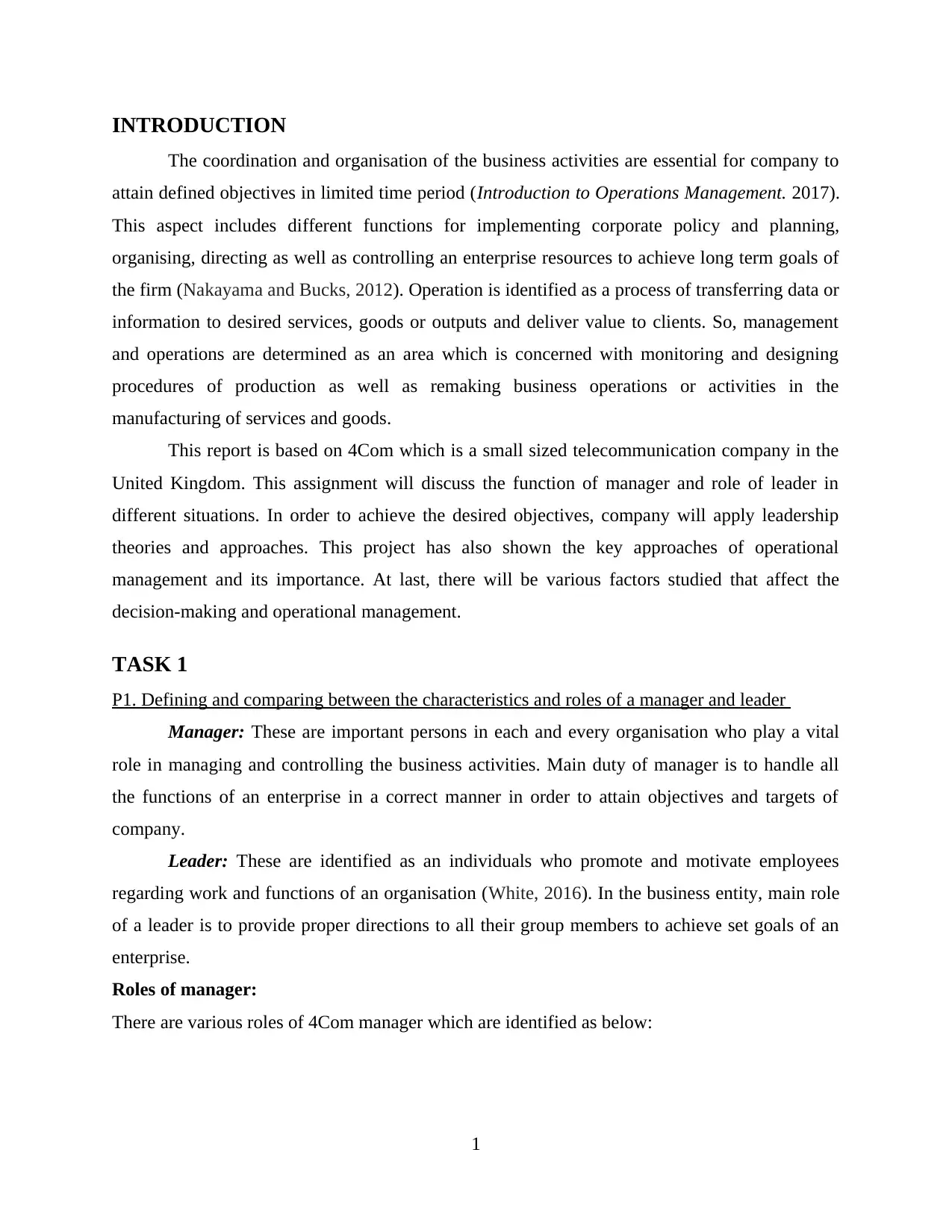
INTRODUCTION
The coordination and organisation of the business activities are essential for company to
attain defined objectives in limited time period (Introduction to Operations Management. 2017).
This aspect includes different functions for implementing corporate policy and planning,
organising, directing as well as controlling an enterprise resources to achieve long term goals of
the firm (Nakayama and Bucks, 2012). Operation is identified as a process of transferring data or
information to desired services, goods or outputs and deliver value to clients. So, management
and operations are determined as an area which is concerned with monitoring and designing
procedures of production as well as remaking business operations or activities in the
manufacturing of services and goods.
This report is based on 4Com which is a small sized telecommunication company in the
United Kingdom. This assignment will discuss the function of manager and role of leader in
different situations. In order to achieve the desired objectives, company will apply leadership
theories and approaches. This project has also shown the key approaches of operational
management and its importance. At last, there will be various factors studied that affect the
decision-making and operational management.
TASK 1
P1. Defining and comparing between the characteristics and roles of a manager and leader
Manager: These are important persons in each and every organisation who play a vital
role in managing and controlling the business activities. Main duty of manager is to handle all
the functions of an enterprise in a correct manner in order to attain objectives and targets of
company.
Leader: These are identified as an individuals who promote and motivate employees
regarding work and functions of an organisation (White, 2016). In the business entity, main role
of a leader is to provide proper directions to all their group members to achieve set goals of an
enterprise.
Roles of manager:
There are various roles of 4Com manager which are identified as below:
1
The coordination and organisation of the business activities are essential for company to
attain defined objectives in limited time period (Introduction to Operations Management. 2017).
This aspect includes different functions for implementing corporate policy and planning,
organising, directing as well as controlling an enterprise resources to achieve long term goals of
the firm (Nakayama and Bucks, 2012). Operation is identified as a process of transferring data or
information to desired services, goods or outputs and deliver value to clients. So, management
and operations are determined as an area which is concerned with monitoring and designing
procedures of production as well as remaking business operations or activities in the
manufacturing of services and goods.
This report is based on 4Com which is a small sized telecommunication company in the
United Kingdom. This assignment will discuss the function of manager and role of leader in
different situations. In order to achieve the desired objectives, company will apply leadership
theories and approaches. This project has also shown the key approaches of operational
management and its importance. At last, there will be various factors studied that affect the
decision-making and operational management.
TASK 1
P1. Defining and comparing between the characteristics and roles of a manager and leader
Manager: These are important persons in each and every organisation who play a vital
role in managing and controlling the business activities. Main duty of manager is to handle all
the functions of an enterprise in a correct manner in order to attain objectives and targets of
company.
Leader: These are identified as an individuals who promote and motivate employees
regarding work and functions of an organisation (White, 2016). In the business entity, main role
of a leader is to provide proper directions to all their group members to achieve set goals of an
enterprise.
Roles of manager:
There are various roles of 4Com manager which are identified as below:
1
⊘ This is a preview!⊘
Do you want full access?
Subscribe today to unlock all pages.

Trusted by 1+ million students worldwide
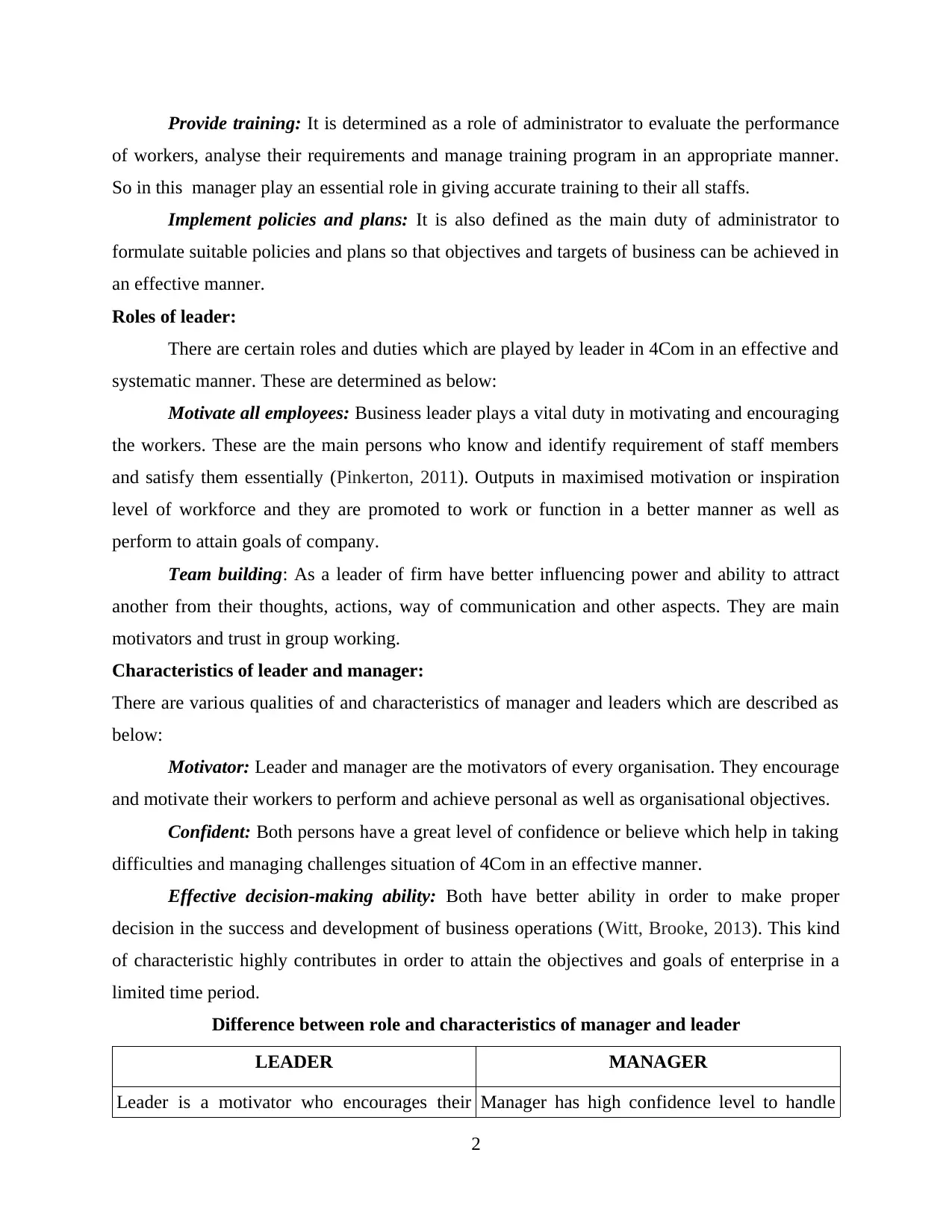
Provide training: It is determined as a role of administrator to evaluate the performance
of workers, analyse their requirements and manage training program in an appropriate manner.
So in this manager play an essential role in giving accurate training to their all staffs.
Implement policies and plans: It is also defined as the main duty of administrator to
formulate suitable policies and plans so that objectives and targets of business can be achieved in
an effective manner.
Roles of leader:
There are certain roles and duties which are played by leader in 4Com in an effective and
systematic manner. These are determined as below:
Motivate all employees: Business leader plays a vital duty in motivating and encouraging
the workers. These are the main persons who know and identify requirement of staff members
and satisfy them essentially (Pinkerton, 2011). Outputs in maximised motivation or inspiration
level of workforce and they are promoted to work or function in a better manner as well as
perform to attain goals of company.
Team building: As a leader of firm have better influencing power and ability to attract
another from their thoughts, actions, way of communication and other aspects. They are main
motivators and trust in group working.
Characteristics of leader and manager:
There are various qualities of and characteristics of manager and leaders which are described as
below:
Motivator: Leader and manager are the motivators of every organisation. They encourage
and motivate their workers to perform and achieve personal as well as organisational objectives.
Confident: Both persons have a great level of confidence or believe which help in taking
difficulties and managing challenges situation of 4Com in an effective manner.
Effective decision-making ability: Both have better ability in order to make proper
decision in the success and development of business operations (Witt, Brooke, 2013). This kind
of characteristic highly contributes in order to attain the objectives and goals of enterprise in a
limited time period.
Difference between role and characteristics of manager and leader
LEADER MANAGER
Leader is a motivator who encourages their Manager has high confidence level to handle
2
of workers, analyse their requirements and manage training program in an appropriate manner.
So in this manager play an essential role in giving accurate training to their all staffs.
Implement policies and plans: It is also defined as the main duty of administrator to
formulate suitable policies and plans so that objectives and targets of business can be achieved in
an effective manner.
Roles of leader:
There are certain roles and duties which are played by leader in 4Com in an effective and
systematic manner. These are determined as below:
Motivate all employees: Business leader plays a vital duty in motivating and encouraging
the workers. These are the main persons who know and identify requirement of staff members
and satisfy them essentially (Pinkerton, 2011). Outputs in maximised motivation or inspiration
level of workforce and they are promoted to work or function in a better manner as well as
perform to attain goals of company.
Team building: As a leader of firm have better influencing power and ability to attract
another from their thoughts, actions, way of communication and other aspects. They are main
motivators and trust in group working.
Characteristics of leader and manager:
There are various qualities of and characteristics of manager and leaders which are described as
below:
Motivator: Leader and manager are the motivators of every organisation. They encourage
and motivate their workers to perform and achieve personal as well as organisational objectives.
Confident: Both persons have a great level of confidence or believe which help in taking
difficulties and managing challenges situation of 4Com in an effective manner.
Effective decision-making ability: Both have better ability in order to make proper
decision in the success and development of business operations (Witt, Brooke, 2013). This kind
of characteristic highly contributes in order to attain the objectives and goals of enterprise in a
limited time period.
Difference between role and characteristics of manager and leader
LEADER MANAGER
Leader is a motivator who encourages their Manager has high confidence level to handle
2
Paraphrase This Document
Need a fresh take? Get an instant paraphrase of this document with our AI Paraphraser
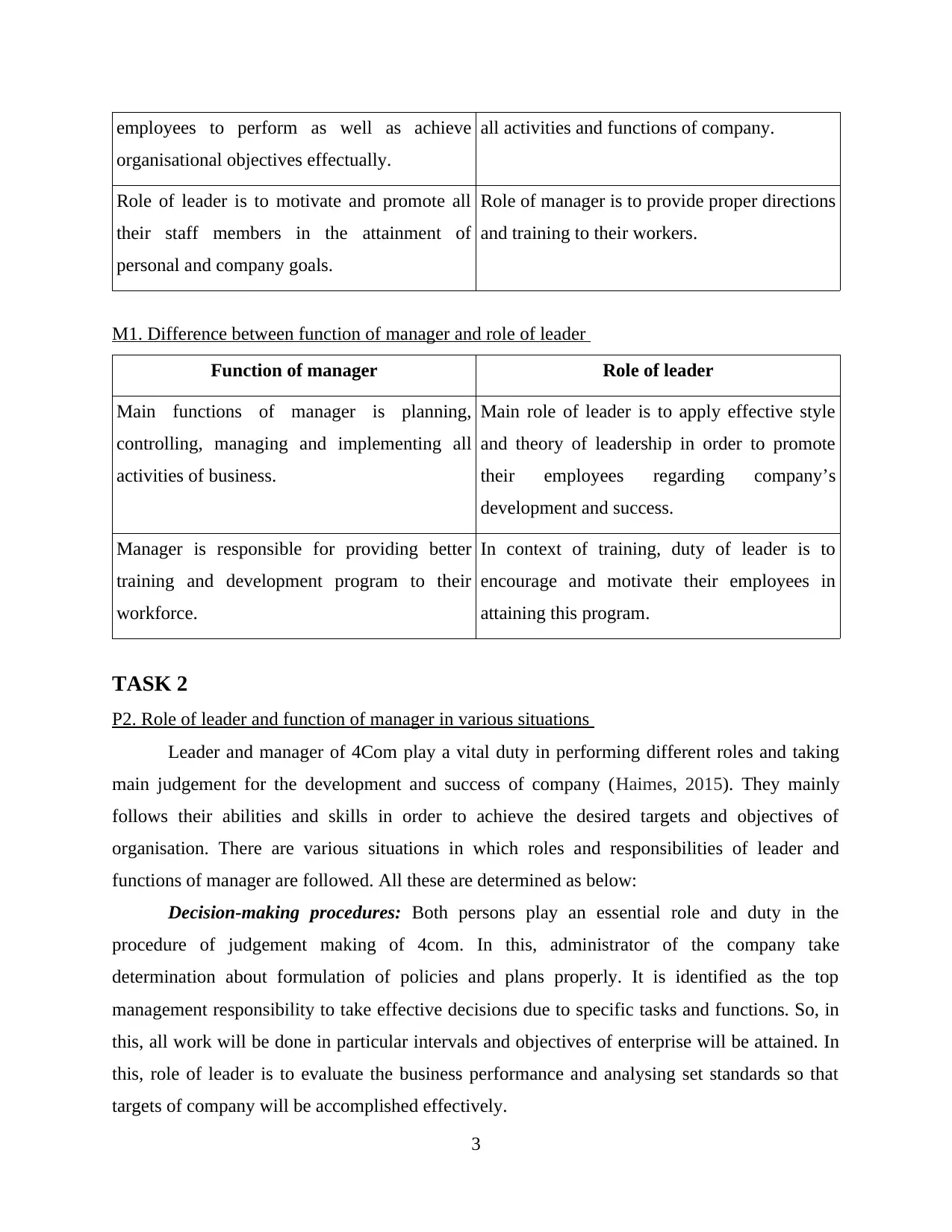
employees to perform as well as achieve
organisational objectives effectually.
all activities and functions of company.
Role of leader is to motivate and promote all
their staff members in the attainment of
personal and company goals.
Role of manager is to provide proper directions
and training to their workers.
M1. Difference between function of manager and role of leader
Function of manager Role of leader
Main functions of manager is planning,
controlling, managing and implementing all
activities of business.
Main role of leader is to apply effective style
and theory of leadership in order to promote
their employees regarding company’s
development and success.
Manager is responsible for providing better
training and development program to their
workforce.
In context of training, duty of leader is to
encourage and motivate their employees in
attaining this program.
TASK 2
P2. Role of leader and function of manager in various situations
Leader and manager of 4Com play a vital duty in performing different roles and taking
main judgement for the development and success of company (Haimes, 2015). They mainly
follows their abilities and skills in order to achieve the desired targets and objectives of
organisation. There are various situations in which roles and responsibilities of leader and
functions of manager are followed. All these are determined as below:
Decision-making procedures: Both persons play an essential role and duty in the
procedure of judgement making of 4com. In this, administrator of the company take
determination about formulation of policies and plans properly. It is identified as the top
management responsibility to take effective decisions due to specific tasks and functions. So, in
this, all work will be done in particular intervals and objectives of enterprise will be attained. In
this, role of leader is to evaluate the business performance and analysing set standards so that
targets of company will be accomplished effectively.
3
organisational objectives effectually.
all activities and functions of company.
Role of leader is to motivate and promote all
their staff members in the attainment of
personal and company goals.
Role of manager is to provide proper directions
and training to their workers.
M1. Difference between function of manager and role of leader
Function of manager Role of leader
Main functions of manager is planning,
controlling, managing and implementing all
activities of business.
Main role of leader is to apply effective style
and theory of leadership in order to promote
their employees regarding company’s
development and success.
Manager is responsible for providing better
training and development program to their
workforce.
In context of training, duty of leader is to
encourage and motivate their employees in
attaining this program.
TASK 2
P2. Role of leader and function of manager in various situations
Leader and manager of 4Com play a vital duty in performing different roles and taking
main judgement for the development and success of company (Haimes, 2015). They mainly
follows their abilities and skills in order to achieve the desired targets and objectives of
organisation. There are various situations in which roles and responsibilities of leader and
functions of manager are followed. All these are determined as below:
Decision-making procedures: Both persons play an essential role and duty in the
procedure of judgement making of 4com. In this, administrator of the company take
determination about formulation of policies and plans properly. It is identified as the top
management responsibility to take effective decisions due to specific tasks and functions. So, in
this, all work will be done in particular intervals and objectives of enterprise will be attained. In
this, role of leader is to evaluate the business performance and analysing set standards so that
targets of company will be accomplished effectively.
3
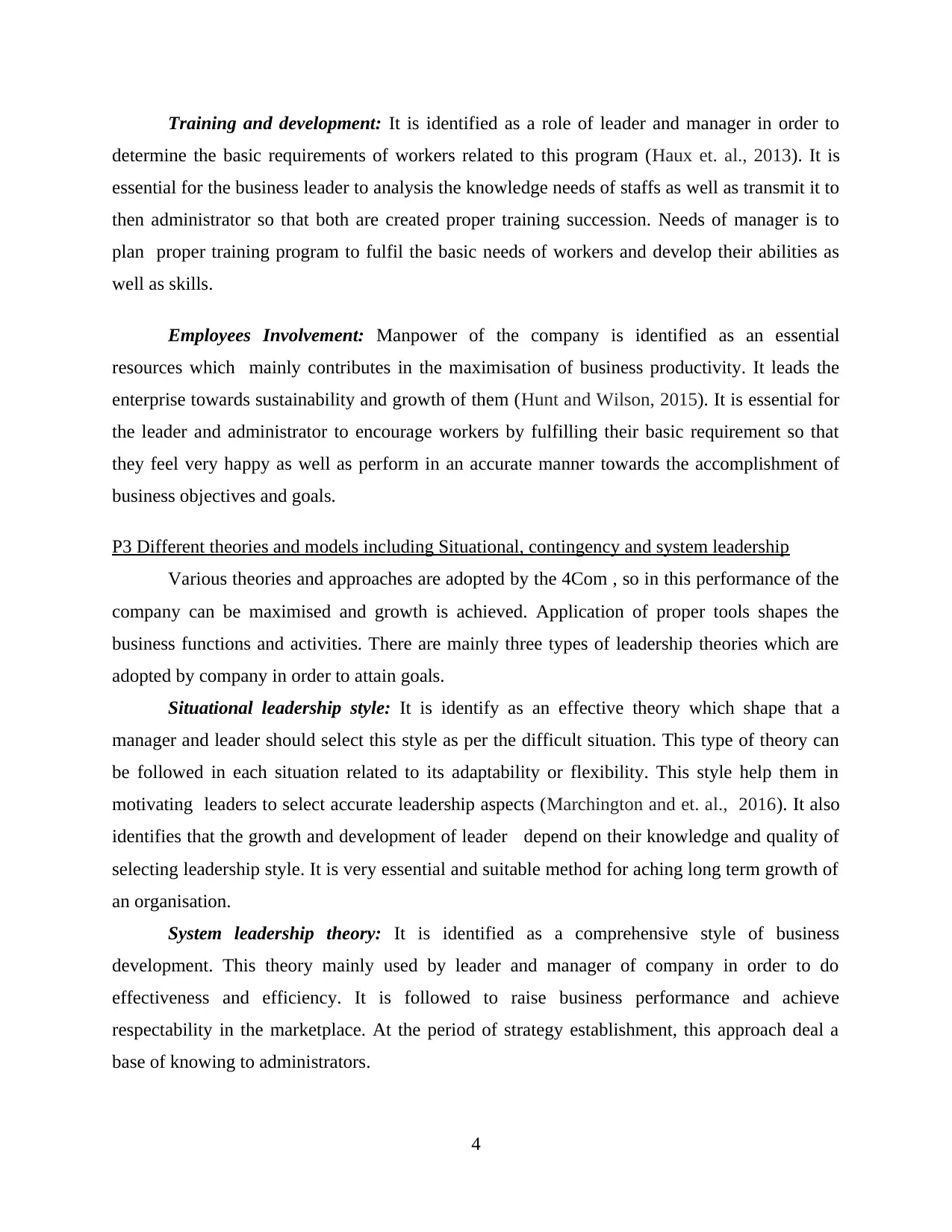
Training and development: It is identified as a role of leader and manager in order to
determine the basic requirements of workers related to this program (Haux et. al., 2013). It is
essential for the business leader to analysis the knowledge needs of staffs as well as transmit it to
then administrator so that both are created proper training succession. Needs of manager is to
plan proper training program to fulfil the basic needs of workers and develop their abilities as
well as skills.
Employees Involvement: Manpower of the company is identified as an essential
resources which mainly contributes in the maximisation of business productivity. It leads the
enterprise towards sustainability and growth of them (Hunt and Wilson, 2015). It is essential for
the leader and administrator to encourage workers by fulfilling their basic requirement so that
they feel very happy as well as perform in an accurate manner towards the accomplishment of
business objectives and goals.
P3 Different theories and models including Situational, contingency and system leadership
Various theories and approaches are adopted by the 4Com , so in this performance of the
company can be maximised and growth is achieved. Application of proper tools shapes the
business functions and activities. There are mainly three types of leadership theories which are
adopted by company in order to attain goals.
Situational leadership style: It is identify as an effective theory which shape that a
manager and leader should select this style as per the difficult situation. This type of theory can
be followed in each situation related to its adaptability or flexibility. This style help them in
motivating leaders to select accurate leadership aspects (Marchington and et. al., 2016). It also
identifies that the growth and development of leader depend on their knowledge and quality of
selecting leadership style. It is very essential and suitable method for aching long term growth of
an organisation.
System leadership theory: It is identified as a comprehensive style of business
development. This theory mainly used by leader and manager of company in order to do
effectiveness and efficiency. It is followed to raise business performance and achieve
respectability in the marketplace. At the period of strategy establishment, this approach deal a
base of knowing to administrators.
4
determine the basic requirements of workers related to this program (Haux et. al., 2013). It is
essential for the business leader to analysis the knowledge needs of staffs as well as transmit it to
then administrator so that both are created proper training succession. Needs of manager is to
plan proper training program to fulfil the basic needs of workers and develop their abilities as
well as skills.
Employees Involvement: Manpower of the company is identified as an essential
resources which mainly contributes in the maximisation of business productivity. It leads the
enterprise towards sustainability and growth of them (Hunt and Wilson, 2015). It is essential for
the leader and administrator to encourage workers by fulfilling their basic requirement so that
they feel very happy as well as perform in an accurate manner towards the accomplishment of
business objectives and goals.
P3 Different theories and models including Situational, contingency and system leadership
Various theories and approaches are adopted by the 4Com , so in this performance of the
company can be maximised and growth is achieved. Application of proper tools shapes the
business functions and activities. There are mainly three types of leadership theories which are
adopted by company in order to attain goals.
Situational leadership style: It is identify as an effective theory which shape that a
manager and leader should select this style as per the difficult situation. This type of theory can
be followed in each situation related to its adaptability or flexibility. This style help them in
motivating leaders to select accurate leadership aspects (Marchington and et. al., 2016). It also
identifies that the growth and development of leader depend on their knowledge and quality of
selecting leadership style. It is very essential and suitable method for aching long term growth of
an organisation.
System leadership theory: It is identified as a comprehensive style of business
development. This theory mainly used by leader and manager of company in order to do
effectiveness and efficiency. It is followed to raise business performance and achieve
respectability in the marketplace. At the period of strategy establishment, this approach deal a
base of knowing to administrators.
4
⊘ This is a preview!⊘
Do you want full access?
Subscribe today to unlock all pages.

Trusted by 1+ million students worldwide
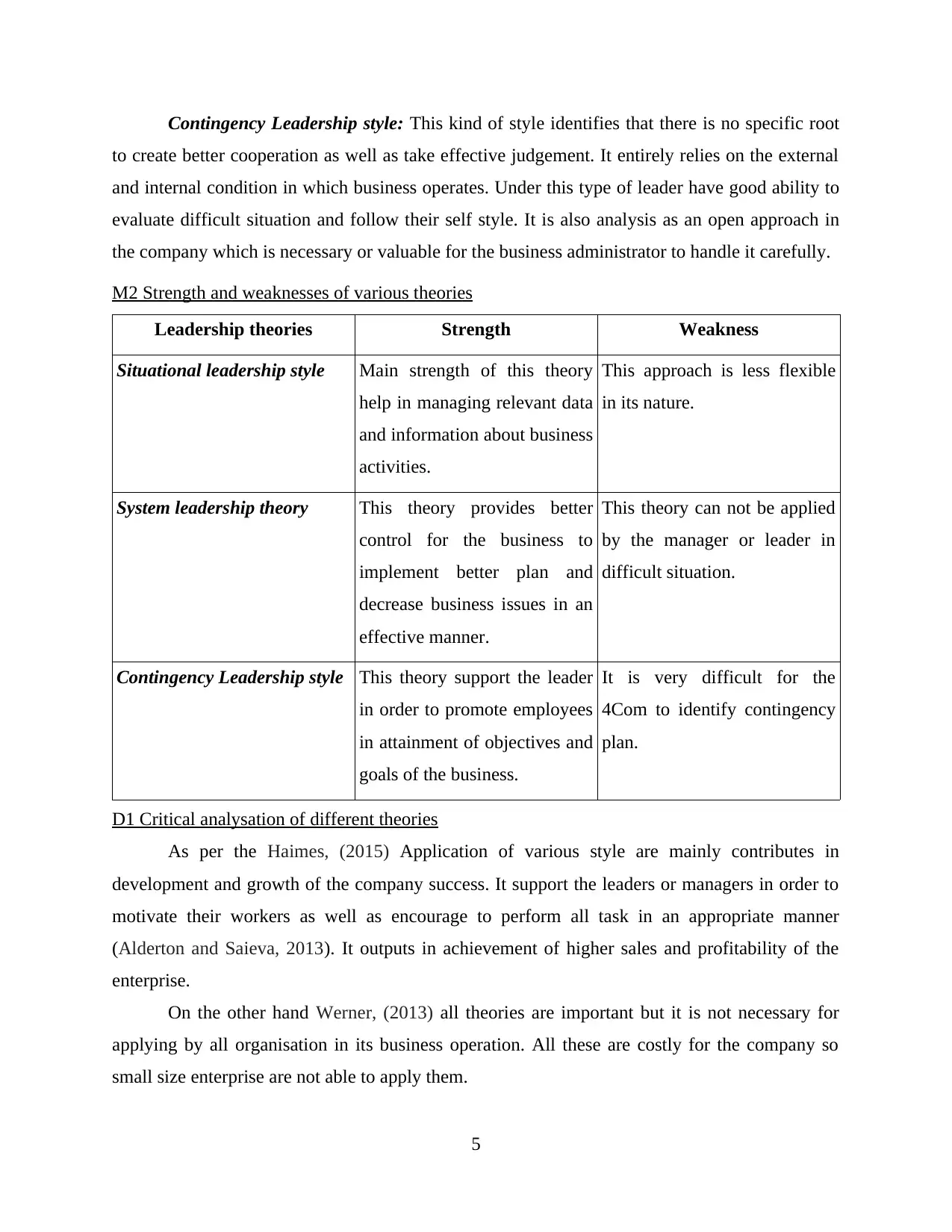
Contingency Leadership style: This kind of style identifies that there is no specific root
to create better cooperation as well as take effective judgement. It entirely relies on the external
and internal condition in which business operates. Under this type of leader have good ability to
evaluate difficult situation and follow their self style. It is also analysis as an open approach in
the company which is necessary or valuable for the business administrator to handle it carefully.
M2 Strength and weaknesses of various theories
Leadership theories Strength Weakness
Situational leadership style Main strength of this theory
help in managing relevant data
and information about business
activities.
This approach is less flexible
in its nature.
System leadership theory This theory provides better
control for the business to
implement better plan and
decrease business issues in an
effective manner.
This theory can not be applied
by the manager or leader in
difficult situation.
Contingency Leadership style This theory support the leader
in order to promote employees
in attainment of objectives and
goals of the business.
It is very difficult for the
4Com to identify contingency
plan.
D1 Critical analysation of different theories
As per the Haimes, (2015) Application of various style are mainly contributes in
development and growth of the company success. It support the leaders or managers in order to
motivate their workers as well as encourage to perform all task in an appropriate manner
(Alderton and Saieva, 2013). It outputs in achievement of higher sales and profitability of the
enterprise.
On the other hand Werner, (2013) all theories are important but it is not necessary for
applying by all organisation in its business operation. All these are costly for the company so
small size enterprise are not able to apply them.
5
to create better cooperation as well as take effective judgement. It entirely relies on the external
and internal condition in which business operates. Under this type of leader have good ability to
evaluate difficult situation and follow their self style. It is also analysis as an open approach in
the company which is necessary or valuable for the business administrator to handle it carefully.
M2 Strength and weaknesses of various theories
Leadership theories Strength Weakness
Situational leadership style Main strength of this theory
help in managing relevant data
and information about business
activities.
This approach is less flexible
in its nature.
System leadership theory This theory provides better
control for the business to
implement better plan and
decrease business issues in an
effective manner.
This theory can not be applied
by the manager or leader in
difficult situation.
Contingency Leadership style This theory support the leader
in order to promote employees
in attainment of objectives and
goals of the business.
It is very difficult for the
4Com to identify contingency
plan.
D1 Critical analysation of different theories
As per the Haimes, (2015) Application of various style are mainly contributes in
development and growth of the company success. It support the leaders or managers in order to
motivate their workers as well as encourage to perform all task in an appropriate manner
(Alderton and Saieva, 2013). It outputs in achievement of higher sales and profitability of the
enterprise.
On the other hand Werner, (2013) all theories are important but it is not necessary for
applying by all organisation in its business operation. All these are costly for the company so
small size enterprise are not able to apply them.
5
Paraphrase This Document
Need a fresh take? Get an instant paraphrase of this document with our AI Paraphraser
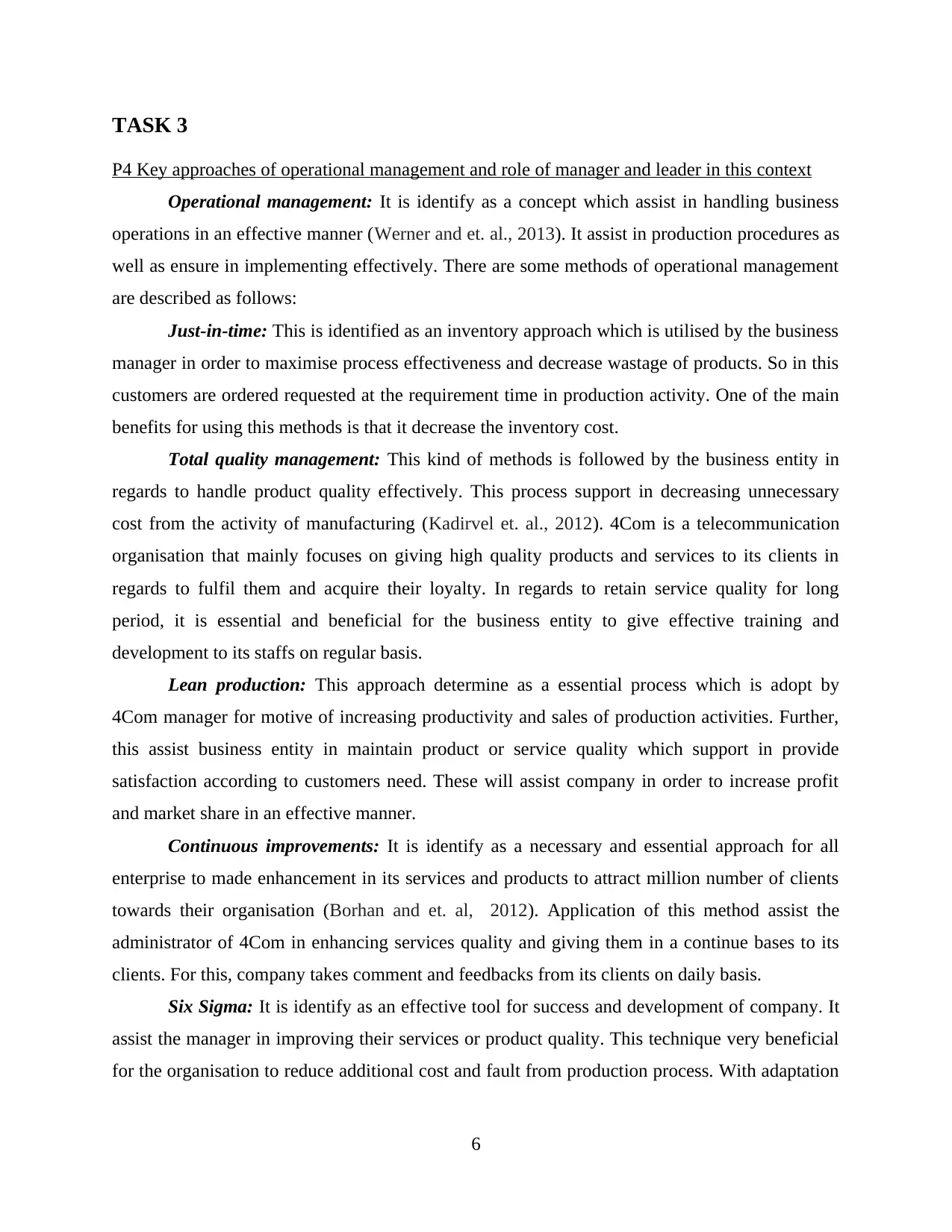
TASK 3
P4 Key approaches of operational management and role of manager and leader in this context
Operational management: It is identify as a concept which assist in handling business
operations in an effective manner (Werner and et. al., 2013). It assist in production procedures as
well as ensure in implementing effectively. There are some methods of operational management
are described as follows:
Just-in-time: This is identified as an inventory approach which is utilised by the business
manager in order to maximise process effectiveness and decrease wastage of products. So in this
customers are ordered requested at the requirement time in production activity. One of the main
benefits for using this methods is that it decrease the inventory cost.
Total quality management: This kind of methods is followed by the business entity in
regards to handle product quality effectively. This process support in decreasing unnecessary
cost from the activity of manufacturing (Kadirvel et. al., 2012). 4Com is a telecommunication
organisation that mainly focuses on giving high quality products and services to its clients in
regards to fulfil them and acquire their loyalty. In regards to retain service quality for long
period, it is essential and beneficial for the business entity to give effective training and
development to its staffs on regular basis.
Lean production: This approach determine as a essential process which is adopt by
4Com manager for motive of increasing productivity and sales of production activities. Further,
this assist business entity in maintain product or service quality which support in provide
satisfaction according to customers need. These will assist company in order to increase profit
and market share in an effective manner.
Continuous improvements: It is identify as a necessary and essential approach for all
enterprise to made enhancement in its services and products to attract million number of clients
towards their organisation (Borhan and et. al, 2012). Application of this method assist the
administrator of 4Com in enhancing services quality and giving them in a continue bases to its
clients. For this, company takes comment and feedbacks from its clients on daily basis.
Six Sigma: It is identify as an effective tool for success and development of company. It
assist the manager in improving their services or product quality. This technique very beneficial
for the organisation to reduce additional cost and fault from production process. With adaptation
6
P4 Key approaches of operational management and role of manager and leader in this context
Operational management: It is identify as a concept which assist in handling business
operations in an effective manner (Werner and et. al., 2013). It assist in production procedures as
well as ensure in implementing effectively. There are some methods of operational management
are described as follows:
Just-in-time: This is identified as an inventory approach which is utilised by the business
manager in order to maximise process effectiveness and decrease wastage of products. So in this
customers are ordered requested at the requirement time in production activity. One of the main
benefits for using this methods is that it decrease the inventory cost.
Total quality management: This kind of methods is followed by the business entity in
regards to handle product quality effectively. This process support in decreasing unnecessary
cost from the activity of manufacturing (Kadirvel et. al., 2012). 4Com is a telecommunication
organisation that mainly focuses on giving high quality products and services to its clients in
regards to fulfil them and acquire their loyalty. In regards to retain service quality for long
period, it is essential and beneficial for the business entity to give effective training and
development to its staffs on regular basis.
Lean production: This approach determine as a essential process which is adopt by
4Com manager for motive of increasing productivity and sales of production activities. Further,
this assist business entity in maintain product or service quality which support in provide
satisfaction according to customers need. These will assist company in order to increase profit
and market share in an effective manner.
Continuous improvements: It is identify as a necessary and essential approach for all
enterprise to made enhancement in its services and products to attract million number of clients
towards their organisation (Borhan and et. al, 2012). Application of this method assist the
administrator of 4Com in enhancing services quality and giving them in a continue bases to its
clients. For this, company takes comment and feedbacks from its clients on daily basis.
Six Sigma: It is identify as an effective tool for success and development of company. It
assist the manager in improving their services or product quality. This technique very beneficial
for the organisation to reduce additional cost and fault from production process. With adaptation
6
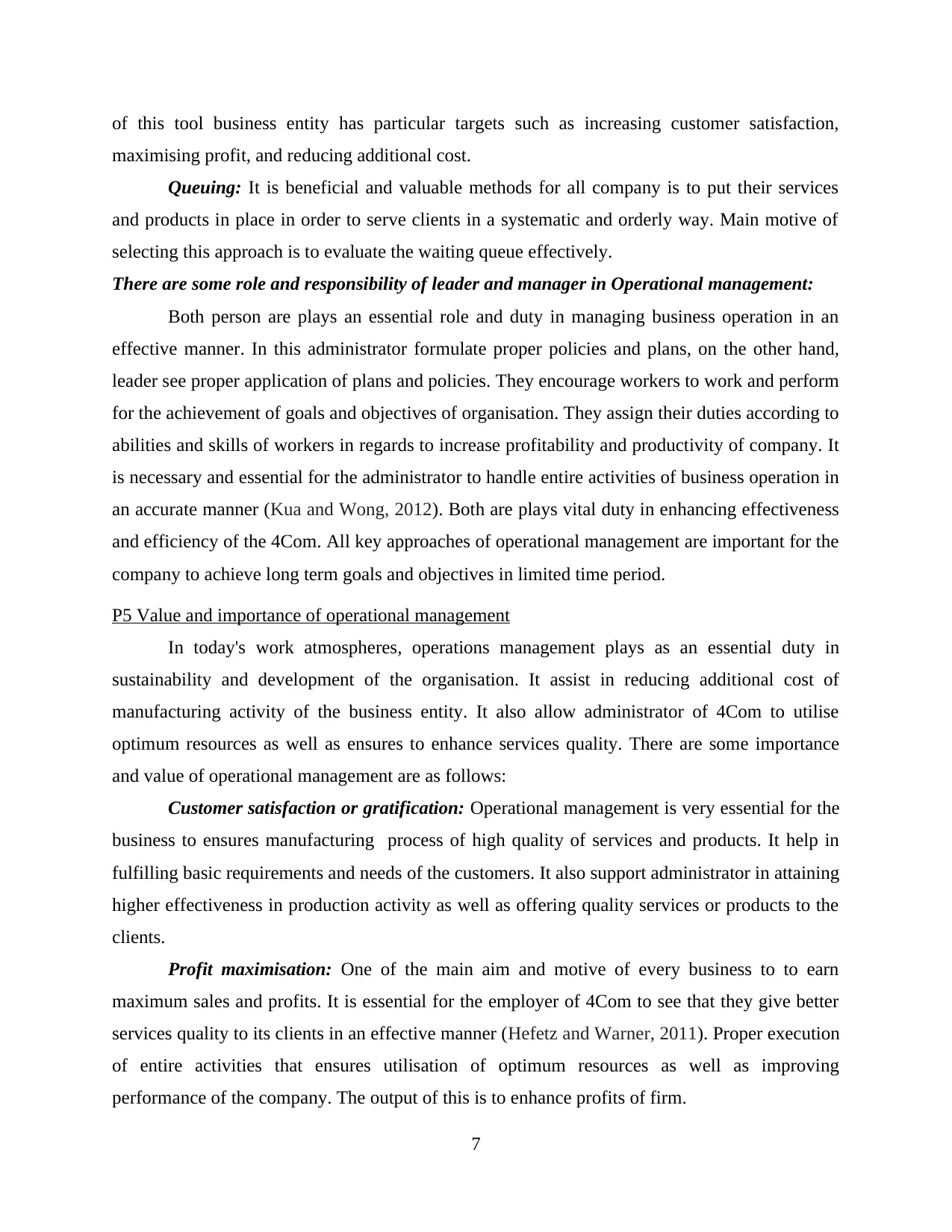
of this tool business entity has particular targets such as increasing customer satisfaction,
maximising profit, and reducing additional cost.
Queuing: It is beneficial and valuable methods for all company is to put their services
and products in place in order to serve clients in a systematic and orderly way. Main motive of
selecting this approach is to evaluate the waiting queue effectively.
There are some role and responsibility of leader and manager in Operational management:
Both person are plays an essential role and duty in managing business operation in an
effective manner. In this administrator formulate proper policies and plans, on the other hand,
leader see proper application of plans and policies. They encourage workers to work and perform
for the achievement of goals and objectives of organisation. They assign their duties according to
abilities and skills of workers in regards to increase profitability and productivity of company. It
is necessary and essential for the administrator to handle entire activities of business operation in
an accurate manner (Kua and Wong, 2012). Both are plays vital duty in enhancing effectiveness
and efficiency of the 4Com. All key approaches of operational management are important for the
company to achieve long term goals and objectives in limited time period.
P5 Value and importance of operational management
In today's work atmospheres, operations management plays as an essential duty in
sustainability and development of the organisation. It assist in reducing additional cost of
manufacturing activity of the business entity. It also allow administrator of 4Com to utilise
optimum resources as well as ensures to enhance services quality. There are some importance
and value of operational management are as follows:
Customer satisfaction or gratification: Operational management is very essential for the
business to ensures manufacturing process of high quality of services and products. It help in
fulfilling basic requirements and needs of the customers. It also support administrator in attaining
higher effectiveness in production activity as well as offering quality services or products to the
clients.
Profit maximisation: One of the main aim and motive of every business to to earn
maximum sales and profits. It is essential for the employer of 4Com to see that they give better
services quality to its clients in an effective manner (Hefetz and Warner, 2011). Proper execution
of entire activities that ensures utilisation of optimum resources as well as improving
performance of the company. The output of this is to enhance profits of firm.
7
maximising profit, and reducing additional cost.
Queuing: It is beneficial and valuable methods for all company is to put their services
and products in place in order to serve clients in a systematic and orderly way. Main motive of
selecting this approach is to evaluate the waiting queue effectively.
There are some role and responsibility of leader and manager in Operational management:
Both person are plays an essential role and duty in managing business operation in an
effective manner. In this administrator formulate proper policies and plans, on the other hand,
leader see proper application of plans and policies. They encourage workers to work and perform
for the achievement of goals and objectives of organisation. They assign their duties according to
abilities and skills of workers in regards to increase profitability and productivity of company. It
is necessary and essential for the administrator to handle entire activities of business operation in
an accurate manner (Kua and Wong, 2012). Both are plays vital duty in enhancing effectiveness
and efficiency of the 4Com. All key approaches of operational management are important for the
company to achieve long term goals and objectives in limited time period.
P5 Value and importance of operational management
In today's work atmospheres, operations management plays as an essential duty in
sustainability and development of the organisation. It assist in reducing additional cost of
manufacturing activity of the business entity. It also allow administrator of 4Com to utilise
optimum resources as well as ensures to enhance services quality. There are some importance
and value of operational management are as follows:
Customer satisfaction or gratification: Operational management is very essential for the
business to ensures manufacturing process of high quality of services and products. It help in
fulfilling basic requirements and needs of the customers. It also support administrator in attaining
higher effectiveness in production activity as well as offering quality services or products to the
clients.
Profit maximisation: One of the main aim and motive of every business to to earn
maximum sales and profits. It is essential for the employer of 4Com to see that they give better
services quality to its clients in an effective manner (Hefetz and Warner, 2011). Proper execution
of entire activities that ensures utilisation of optimum resources as well as improving
performance of the company. The output of this is to enhance profits of firm.
7
⊘ This is a preview!⊘
Do you want full access?
Subscribe today to unlock all pages.

Trusted by 1+ million students worldwide
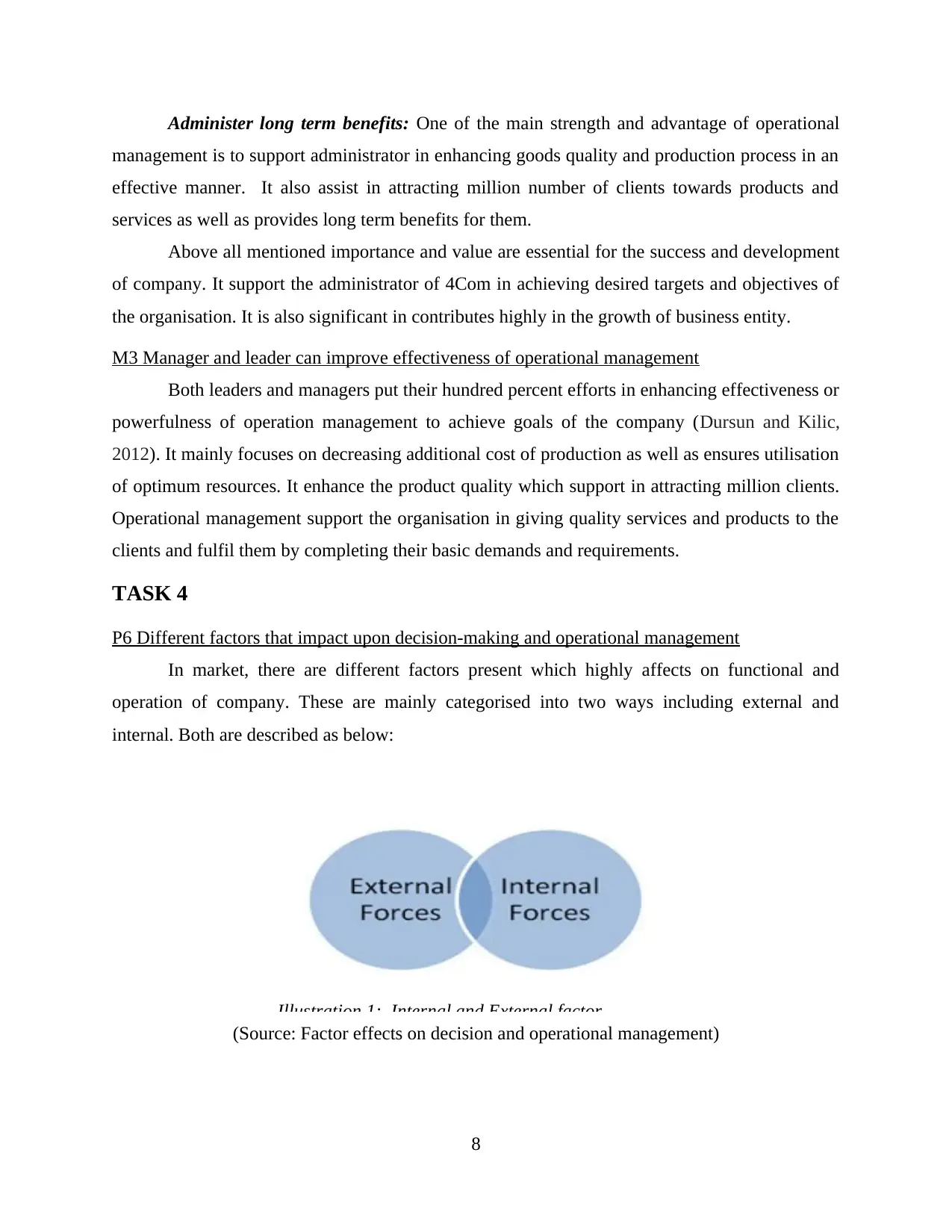
Administer long term benefits: One of the main strength and advantage of operational
management is to support administrator in enhancing goods quality and production process in an
effective manner. It also assist in attracting million number of clients towards products and
services as well as provides long term benefits for them.
Above all mentioned importance and value are essential for the success and development
of company. It support the administrator of 4Com in achieving desired targets and objectives of
the organisation. It is also significant in contributes highly in the growth of business entity.
M3 Manager and leader can improve effectiveness of operational management
Both leaders and managers put their hundred percent efforts in enhancing effectiveness or
powerfulness of operation management to achieve goals of the company (Dursun and Kilic,
2012). It mainly focuses on decreasing additional cost of production as well as ensures utilisation
of optimum resources. It enhance the product quality which support in attracting million clients.
Operational management support the organisation in giving quality services and products to the
clients and fulfil them by completing their basic demands and requirements.
TASK 4
P6 Different factors that impact upon decision-making and operational management
In market, there are different factors present which highly affects on functional and
operation of company. These are mainly categorised into two ways including external and
internal. Both are described as below:
Illustration 1: Internal and External factor
(Source: Factor effects on decision and operational management)
8
management is to support administrator in enhancing goods quality and production process in an
effective manner. It also assist in attracting million number of clients towards products and
services as well as provides long term benefits for them.
Above all mentioned importance and value are essential for the success and development
of company. It support the administrator of 4Com in achieving desired targets and objectives of
the organisation. It is also significant in contributes highly in the growth of business entity.
M3 Manager and leader can improve effectiveness of operational management
Both leaders and managers put their hundred percent efforts in enhancing effectiveness or
powerfulness of operation management to achieve goals of the company (Dursun and Kilic,
2012). It mainly focuses on decreasing additional cost of production as well as ensures utilisation
of optimum resources. It enhance the product quality which support in attracting million clients.
Operational management support the organisation in giving quality services and products to the
clients and fulfil them by completing their basic demands and requirements.
TASK 4
P6 Different factors that impact upon decision-making and operational management
In market, there are different factors present which highly affects on functional and
operation of company. These are mainly categorised into two ways including external and
internal. Both are described as below:
Illustration 1: Internal and External factor
(Source: Factor effects on decision and operational management)
8
Paraphrase This Document
Need a fresh take? Get an instant paraphrase of this document with our AI Paraphraser
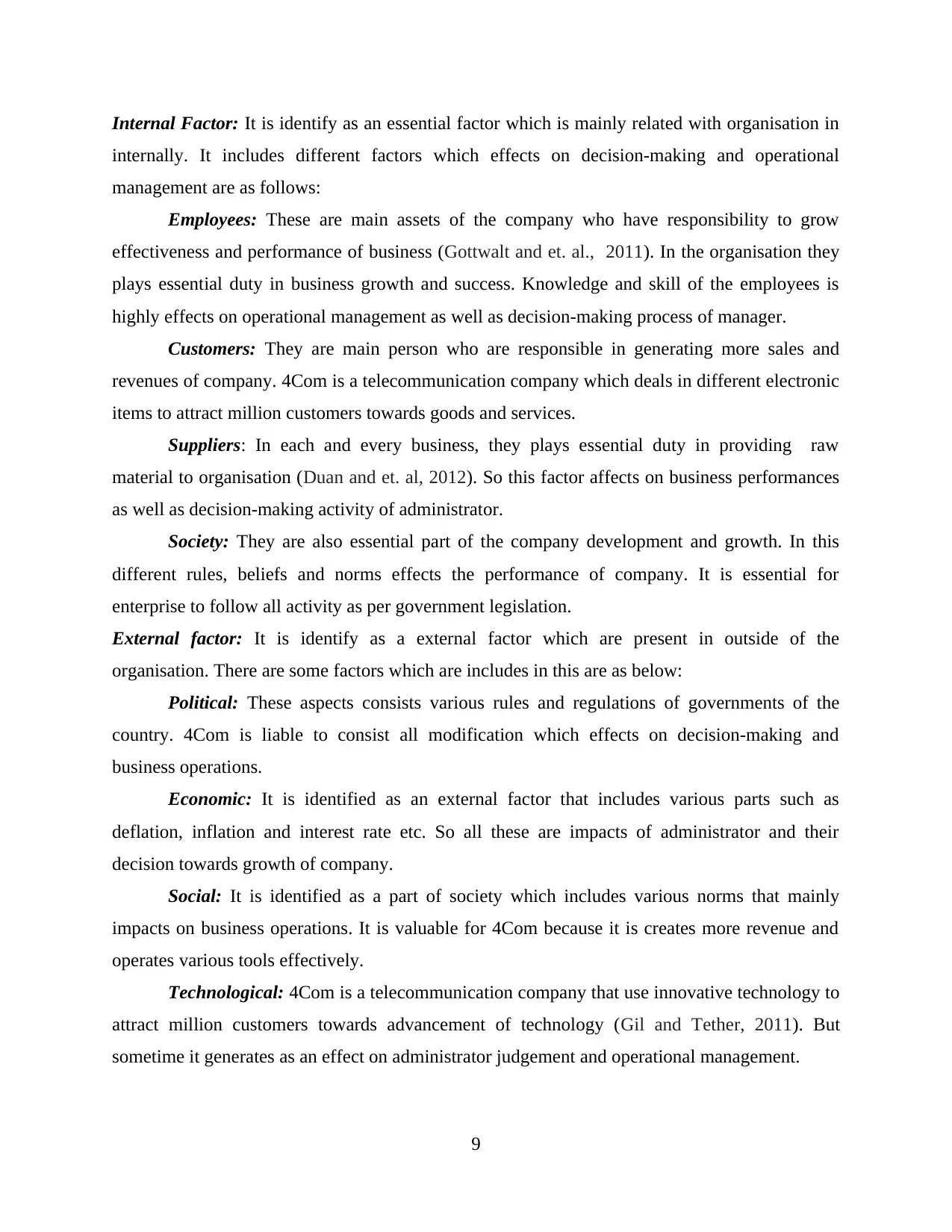
Internal Factor: It is identify as an essential factor which is mainly related with organisation in
internally. It includes different factors which effects on decision-making and operational
management are as follows:
Employees: These are main assets of the company who have responsibility to grow
effectiveness and performance of business (Gottwalt and et. al., 2011). In the organisation they
plays essential duty in business growth and success. Knowledge and skill of the employees is
highly effects on operational management as well as decision-making process of manager.
Customers: They are main person who are responsible in generating more sales and
revenues of company. 4Com is a telecommunication company which deals in different electronic
items to attract million customers towards goods and services.
Suppliers: In each and every business, they plays essential duty in providing raw
material to organisation (Duan and et. al, 2012). So this factor affects on business performances
as well as decision-making activity of administrator.
Society: They are also essential part of the company development and growth. In this
different rules, beliefs and norms effects the performance of company. It is essential for
enterprise to follow all activity as per government legislation.
External factor: It is identify as a external factor which are present in outside of the
organisation. There are some factors which are includes in this are as below:
Political: These aspects consists various rules and regulations of governments of the
country. 4Com is liable to consist all modification which effects on decision-making and
business operations.
Economic: It is identified as an external factor that includes various parts such as
deflation, inflation and interest rate etc. So all these are impacts of administrator and their
decision towards growth of company.
Social: It is identified as a part of society which includes various norms that mainly
impacts on business operations. It is valuable for 4Com because it is creates more revenue and
operates various tools effectively.
Technological: 4Com is a telecommunication company that use innovative technology to
attract million customers towards advancement of technology (Gil and Tether, 2011). But
sometime it generates as an effect on administrator judgement and operational management.
9
internally. It includes different factors which effects on decision-making and operational
management are as follows:
Employees: These are main assets of the company who have responsibility to grow
effectiveness and performance of business (Gottwalt and et. al., 2011). In the organisation they
plays essential duty in business growth and success. Knowledge and skill of the employees is
highly effects on operational management as well as decision-making process of manager.
Customers: They are main person who are responsible in generating more sales and
revenues of company. 4Com is a telecommunication company which deals in different electronic
items to attract million customers towards goods and services.
Suppliers: In each and every business, they plays essential duty in providing raw
material to organisation (Duan and et. al, 2012). So this factor affects on business performances
as well as decision-making activity of administrator.
Society: They are also essential part of the company development and growth. In this
different rules, beliefs and norms effects the performance of company. It is essential for
enterprise to follow all activity as per government legislation.
External factor: It is identify as a external factor which are present in outside of the
organisation. There are some factors which are includes in this are as below:
Political: These aspects consists various rules and regulations of governments of the
country. 4Com is liable to consist all modification which effects on decision-making and
business operations.
Economic: It is identified as an external factor that includes various parts such as
deflation, inflation and interest rate etc. So all these are impacts of administrator and their
decision towards growth of company.
Social: It is identified as a part of society which includes various norms that mainly
impacts on business operations. It is valuable for 4Com because it is creates more revenue and
operates various tools effectively.
Technological: 4Com is a telecommunication company that use innovative technology to
attract million customers towards advancement of technology (Gil and Tether, 2011). But
sometime it generates as an effect on administrator judgement and operational management.
9
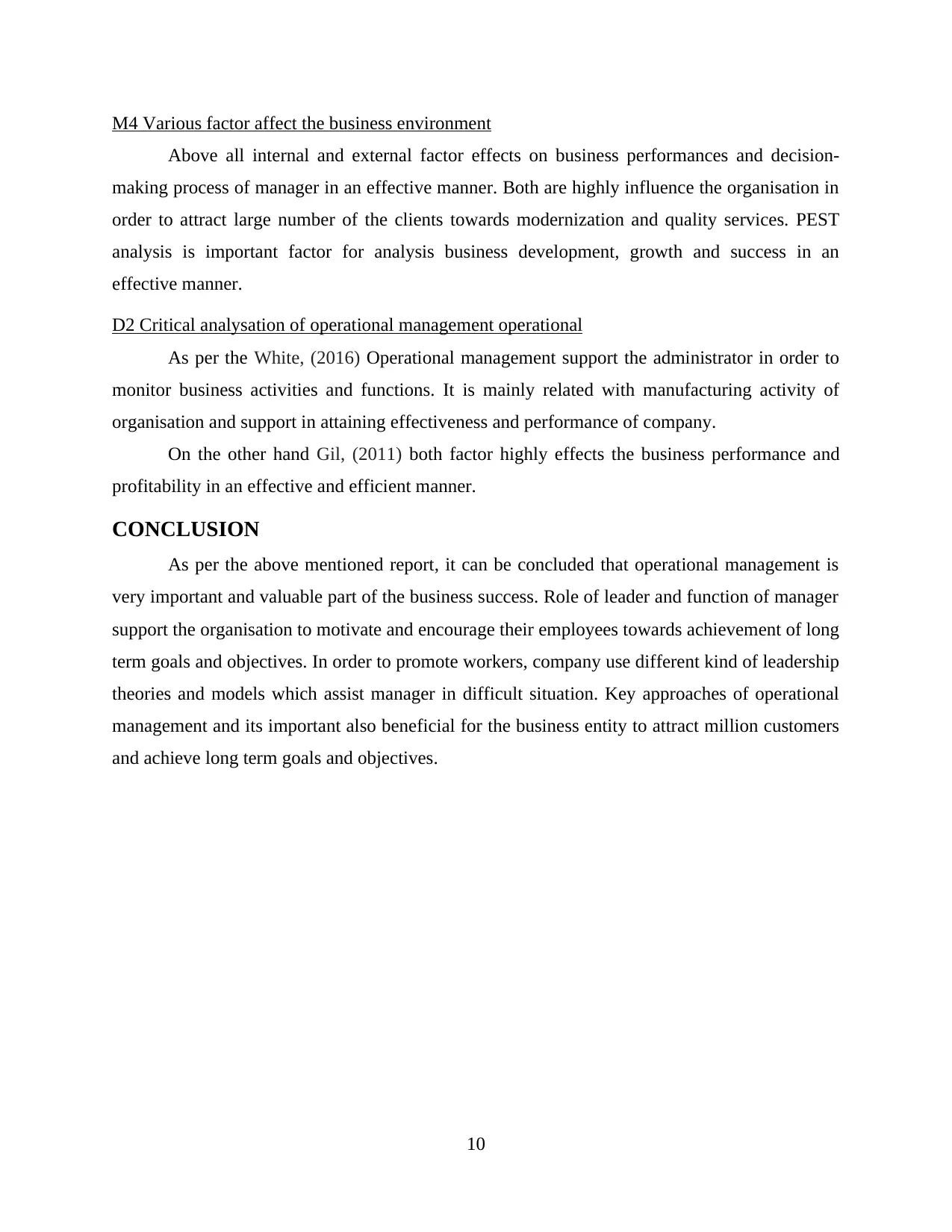
M4 Various factor affect the business environment
Above all internal and external factor effects on business performances and decision-
making process of manager in an effective manner. Both are highly influence the organisation in
order to attract large number of the clients towards modernization and quality services. PEST
analysis is important factor for analysis business development, growth and success in an
effective manner.
D2 Critical analysation of operational management operational
As per the White, (2016) Operational management support the administrator in order to
monitor business activities and functions. It is mainly related with manufacturing activity of
organisation and support in attaining effectiveness and performance of company.
On the other hand Gil, (2011) both factor highly effects the business performance and
profitability in an effective and efficient manner.
CONCLUSION
As per the above mentioned report, it can be concluded that operational management is
very important and valuable part of the business success. Role of leader and function of manager
support the organisation to motivate and encourage their employees towards achievement of long
term goals and objectives. In order to promote workers, company use different kind of leadership
theories and models which assist manager in difficult situation. Key approaches of operational
management and its important also beneficial for the business entity to attract million customers
and achieve long term goals and objectives.
10
Above all internal and external factor effects on business performances and decision-
making process of manager in an effective manner. Both are highly influence the organisation in
order to attract large number of the clients towards modernization and quality services. PEST
analysis is important factor for analysis business development, growth and success in an
effective manner.
D2 Critical analysation of operational management operational
As per the White, (2016) Operational management support the administrator in order to
monitor business activities and functions. It is mainly related with manufacturing activity of
organisation and support in attaining effectiveness and performance of company.
On the other hand Gil, (2011) both factor highly effects the business performance and
profitability in an effective and efficient manner.
CONCLUSION
As per the above mentioned report, it can be concluded that operational management is
very important and valuable part of the business success. Role of leader and function of manager
support the organisation to motivate and encourage their employees towards achievement of long
term goals and objectives. In order to promote workers, company use different kind of leadership
theories and models which assist manager in difficult situation. Key approaches of operational
management and its important also beneficial for the business entity to attract million customers
and achieve long term goals and objectives.
10
⊘ This is a preview!⊘
Do you want full access?
Subscribe today to unlock all pages.

Trusted by 1+ million students worldwide
1 out of 14
Related Documents
Your All-in-One AI-Powered Toolkit for Academic Success.
+13062052269
info@desklib.com
Available 24*7 on WhatsApp / Email
![[object Object]](/_next/static/media/star-bottom.7253800d.svg)
Unlock your academic potential
Copyright © 2020–2026 A2Z Services. All Rights Reserved. Developed and managed by ZUCOL.





